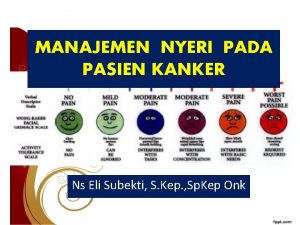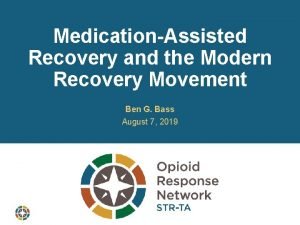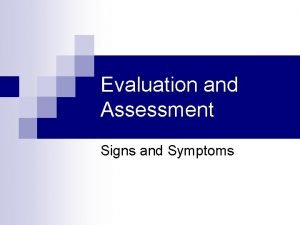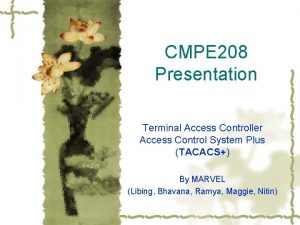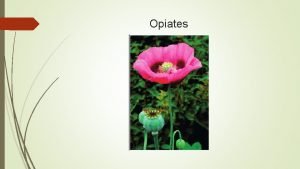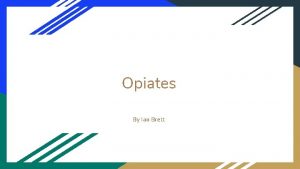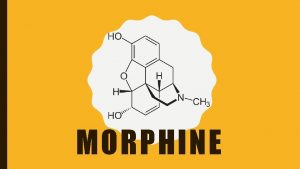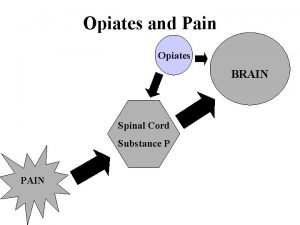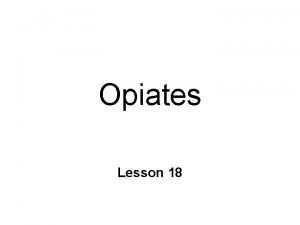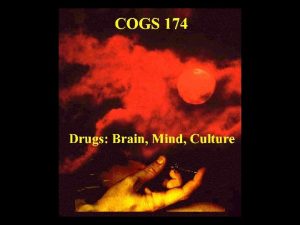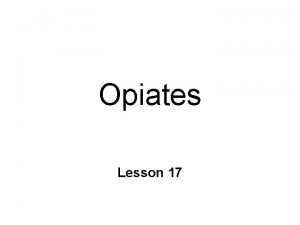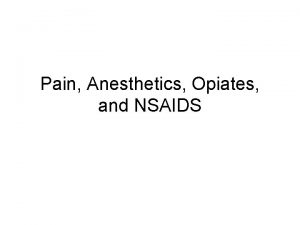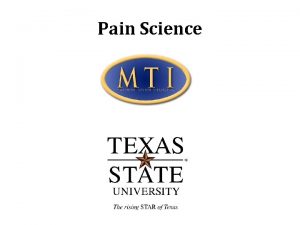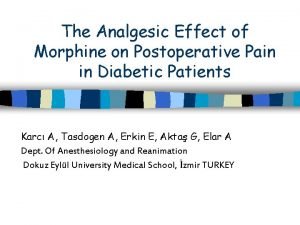Expanding Access to Opiates Morphine for HIVAIDS Pain















- Slides: 15

Expanding Access to Opiates (Morphine) for HIV/AIDS Pain Management in Zambia XVI International AIDS Conference August 13 -18, 2006 Toronto, Canada Gilbert Kombe, Abt Associates Inc. , Bethesda, MD Stella Nkhoma, Abt Associates, Lusaka, Zambia Muriel M. Syacumpi, Abt Associates, Lusaka, Zambia Makaria Reynolds, Abt Associates Inc, Bethesda, MD Nadia Khan, Abt Associates, Inc, Bethesda, MD Paurvi Bhatt, Abt Associates, Inc, Bethesda, MD Catherine Chanfreau, Abt Associates Inc. , Bethesda, MD

Discussion Issues n Purpose and approach n Background on HIV/AIDS pain management n Why push for use of opiates (morphine) in pain management n Legal and policy barriers to pain management n Preliminary efforts underway n Summary and way forward

Purpose of Support for HIV/AIDS Response (SHARe) Project SHARe is a USAID funded project implemented by John Snow International and Abt Associates Purpose n To improve the policy environment related to HIV/AIDS pain management in Zambia

Key Questions SHARe is Addressing 1. What are the existing legal and policy mechanisms supporting the use of morphine in pain management? 2. What are the barriers to morphine prescription and administration by doctors and nurses? 3. How can we influence existing legislation to expand use of morphine in HIV/AIDS pain management? 4. What level of human resource capacity is needed to administer morphine?

SHARe’s Approach n Conducted comprehensive review of existing policies & legislation on the use of morphine in pain management n Held several consensus building meetings with key stakeholders including technical working groups, law enforcement, providers, and beneficiaries n Reviewed best practices in pain management from other low resource countries

Background on Pain Management in HIV/AIDS n Zambia has embraced the World Health Organization use of analgesics in HIV/AIDS (Step Ladder) n n Currently, most facilities have the following opiates: Nonsteroidal anti-inflammatory agents (NSAIDS) n n Opiates (codein, oxycodein, morphine) n n Aspirin, pethindine Codein phosphate, Dihydrocodeine, Fentanyl patches, Morphine (injectable and powder) Complimentary (acupuncture, massage)

Pain Management is Vital for Common Conditions n n n n Herpes Simplex Myopathy Neuropathy Post herpetic neuralgia Candida esophagitis Avascular necrosis Osteopenia

Rationale for Using Opiates in HIV/AIDS Pain Management n Growing recognition that narcotic drugs are absolutely necessary for HIV/AIDS pain management n Little national data on how HIV/AIDS pain is managed. Speculation about under-management of HIV/AIDS pain n With high prevalence of HIV/AIDS n n Adult prevalence rate 17%, 1. 2 million PLWHA Only 51, 000 people receiving ART out of the estimated eligible 200, 000 Many HIV/AIDS individuals do not have access to palliative care WHO estimates 50% of People Living with HIV/AIDS will suffer from severe, chronic pain

Major Challenges to Pain Management in Zambia (1) n Government level n Drug regulatory laws are outdated & require updating to keep up with current trends in HIV/AIDS management n n n Palliative care not addressed in National HIV/AIDS Policy Inadequate staff to ensure availability of narcotic drugs (1 staff) Although the law allows other health professionals to prescribe opiates, most health workers are not aware

Major Challenges to Pain Management in Zambia (2) n Health provider level n n n Fear of legal investigations by anti-narcotic agencies Providers not informed about legal requirements Reluctance by nurses and doctors to prescribe opioids for fear of addiction by patients Hospices not aware of procedures to access morphine Family & Patient Level n n Cultural barriers Stigma to using opiates at home

Preliminary Efforts n SHARe is building consensus among key stakeholders n High level meetings with policy makers from Ministry of Health, Drug Enforcement Commission, National AIDS Council, Palliative Care Association of Zambia and others n Engaging broad base of stakeholder on policy development e. g. General Nursing Council of Zambia, Medical Council of Zambia, MOH (Director of Home Based Care, Director of Policy Development, Pharmacy Specialist), NAC n SHARe is working with advocacy groups (hospice and PLWHA organizations) to put the issue on the HIV/AIDS agenda

Preliminary Efforts n Supporting educational efforts to dispel myths about medical morphine usage among providers n n Reviewing import and distribution regulations regarding opiates n n n Newly formed technical working group planning to develop guidelines on use of opiates in HIV/AIDS pain management Streamlining the process of procurement Improving forecasting of drugs SHARe is documenting and applying best practices for morphine access, based on similar work implemented in Uganda and elsewhere

Preliminary Efforts cont. n Facilitating dialogue between Ministry of Health, NAC, drug enforcement officials and others n Addressing issues of pain and palliative care in the community. n Encouraging the Drug Enforcement Commissions to re-evaluate policies and legislation related to morphine possession and administration

Summary and Way Forward n There is great need for simplification of the complex regulations on who can administer morphine and under what circumstances n There is a need for open, cross-sector dialogue among policy-makers, beneficiaries and civil society on use of morphine n Training of health providers in pain management is urgently needed

Thank you Contact information Stella Nkhoma, SHARe Deputy Chief of Party stenkho@yahoo. com Gilbert Kombe gilbert_kombe@abtassoc. com Nadia Khan nadia_khan@abtassoc. com
 Step ladder who nyeri
Step ladder who nyeri Chiral or achiral
Chiral or achiral Equianalgesie morphine
Equianalgesie morphine History of morphine
History of morphine Droleptan pca morphine
Droleptan pca morphine Lewis mad pain and martian pain
Lewis mad pain and martian pain What is tender breast in pregnancy
What is tender breast in pregnancy Pms or pregnancy
Pms or pregnancy Terminal access controller access control system
Terminal access controller access control system Terminal access controller access-control system
Terminal access controller access-control system Magnetsjukhus
Magnetsjukhus Större och mindre tecken
Större och mindre tecken Adressändring ideell förening
Adressändring ideell förening Toppslätskivling dos
Toppslätskivling dos Redogör för vad psykologi är
Redogör för vad psykologi är Borra hål för knoppar
Borra hål för knoppar
